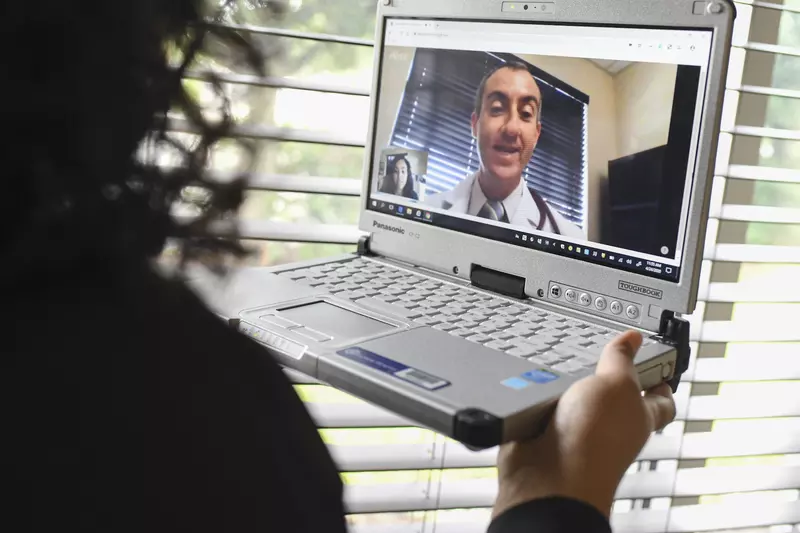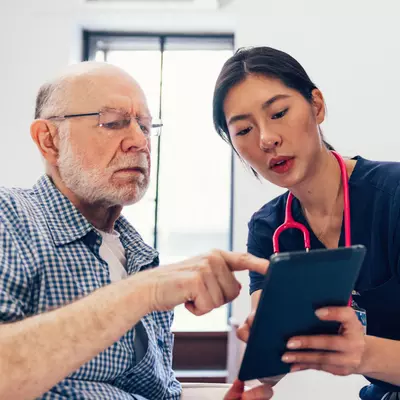- AdventHealth

You’ve done a lot to stay safe and protect others with social distancing, working from home, frequent cleaning and disinfecting and using your face covering. However, as U.S. states begin to reopen and stay-at-home orders are lifted, it’s possible you could come into contact with someone who has COVID-19 — whether they’re visibly sick or asymptomatic.
Scientists and public health officials are investigating treatments and a potential vaccine for the disease. Because approved treatments and a vaccine will take time to develop, we want to make sure you know what to do next if you think you’ve been exposed to coronavirus.
Step 1: Alert Your Health Care Provider
According to recommendations from the Centers for Disease Control and Prevention (CDC), if you think you may have been exposed to COVID-19, you should seek medical advice immediately.
We’re Taking Extra Precautions for Your Protection
If your provider needs to see you in person, we want to assure you that we’re taking extra safety measures for your protection. We have many new safety protocols in place at all our facilities, and we continue to follow the latest guidelines from the CDC.
Here are some of the safety measures you’ll see at AdventHealth facilities:
-
Clear protective barriers between staff and patients in registration areas
-
Redesigned waiting areas that help keep people at least 6 feet apart
-
Separate care areas for anyone who’s sick, apart from other patients and visitors
-
Temperature checks at all facility entrances
-
Universal face mask policy for team members, patients and visitors
Virtual Care Options
If you don’t need in-person care, you can contact your provider by calling your doctor’s office to ask about their virtual care options or make a telehealth appointment. A phone call or video visit through the AdventHealth app can provide your physician with the details needed to make informed decisions about the care you may need — all from the comfort of your home.
Step 2: Stay Home for 14 Days
Guidance from the CDC recommends staying home except to get medical care. In the 14 days that you are home (the maximum amount of time it takes for symptoms to appear, usually), continue to monitor yourself for symptoms. In addition, continue to practice social distancing and maintain 6 feet of space from others. Try to avoid crowded places and wear a cloth face covering when you’re around others.
If possible, keep your distance from people who are at higher risk of severe complications from COVID-19, including:
-
Anyone living in a nursing home or long-term care facility
-
People age 65 and older
Also at high risk are people who have underlying health conditions, including:
-
People with chronic kidney disease undergoing dialysis
-
People with chronic liver disease
-
People with heart conditions
-
People with chronic lung disease or moderate to severe asthma
-
People with diabetes
-
People with severe obesity
-
People who are immunocompromised, or are taking medicines that suppress the immune system, like prednisone
Step 3: Monitor Your Symptoms
The CDC’s coronavirus self-checker advises self-monitoring, which includes checking your temperature twice a day and watching for these symptoms or a combination of symptoms:
-
Cough
-
Shortness of breath
Or at least two of these symptoms:
-
Chills or repeated shaking with chills
-
Fever
-
Headache
-
Muscle pain
-
New loss of taste or smell
-
Sore throat
Typically, symptoms may appear within two to 14 days after exposure to COVID-19.
If your symptoms remain mild, the CDC recommends staying in touch with your physician, getting lots of rest and staying hydrated by drinking plenty of water and clear fluids. It’s fine to take over-the-counter medicine, such as acetaminophen, to help you feel better.
However, if you experience any of these emergency warning signs, seek immediate medical attention:
-
Bluish lips or face
-
New confusion or inability to arouse
-
Persistent pain or pressure in your chest
-
Trouble breathing
If you are experiencing shortness of breath, signs of a stroke or a heart attack, please call 911 immediately.
Ask your health care provider if there are other emergency signs you should watch for.
Step 4: If Symptoms Don’t Develop, Continue Taking Steps to Protect Yourself
Keep up the good work to protect yourself and others by:
-
Avoiding close contact with those who are sick
-
Covering your coughs and sneezes with a tissue
-
Covering your mouth and nose with a cloth face cover if you’re out in public
-
Frequently cleaning high-touch surfaces such as faucets and doorknobs
-
Staying home as much as possible
-
Washing your hands often
Nothing Is More Important to Us Than You
Your safety is our priority. If you think you’ve been exposed to COVID-19, follow the steps above to keep yourself and others safe as you heal. And if you need medical care, rest assured that we’re here to care for you, with extra safety measures for in-person care and convenient virtual care options as well. Learn more about our safety precautions, or get started with your care by finding a doctor near you today.


